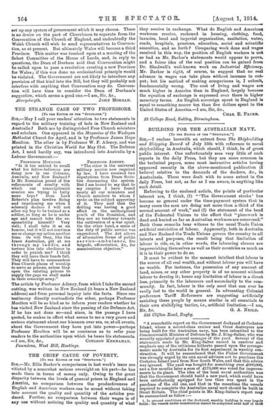THE CHIEF CAUSE OF POVERTY.
[To THE EDITOR Or THE "SPECTATOR."' Sin,—Mr. Ellis Barker's comparisons in last week's issue are vitiated by a somewhat serious oversight on his part—he has made them in terms of money only. Owing to the great disparity between the levels of general prices in England and America, no comparison between the productiveness of English and American workers can be sound without taking into account the quality and quantity of the articles pro- duced. Further, no comparison between their wages is of any use without noticing the quality and quantity of what they receive in exchange. What do English and American workmen receive, reckoned in housing, clothing, food, luxuries, local and imperial organization, sanitation, water, roads, hospitals, pensions, education, social and scientific: amenities, and so forth P Comparing work done and wages received in this way, the position of English workers is not so bad as Mr. Barker's statements would appear to prove, and a fairer idea of the real position can be gained from Dr. Shadwell's well-known work on Industrial Efficiency. Mr. Barker is right, of course, to suggest that no real advance in wages can take place without increase in outs put; but his method of making comparisons is, I submit, fundamentally wrong. The cost of living and wages are much higher in America than in England, largely because the equation of exchange is expressed over there in higher monetary terms. An English sovereign spent in England is equal to something nearer ten than five dollars spent in the United States of America.—I am, Sir, &c.,


































 Previous page
Previous page